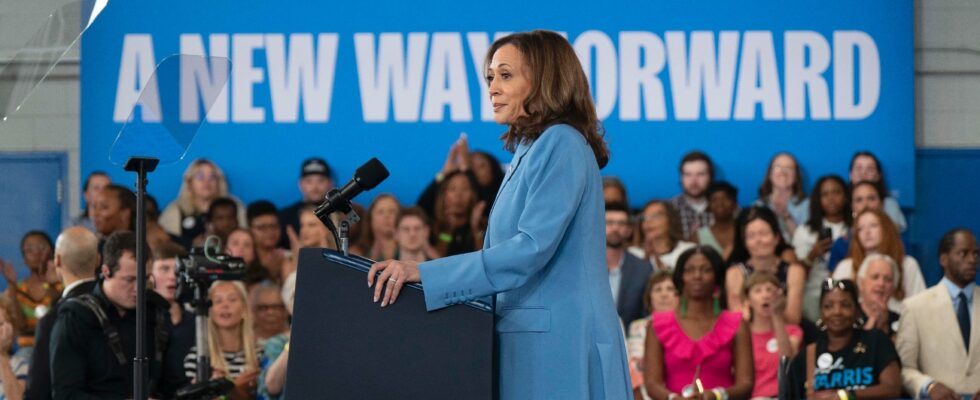Three months before the presidential election, the Democratic candidate delivered an optimistic speech in a country where she wants to create “an economy of opportunity”. Vice President Kamala Harris addressed the middle and working classes during the presentation of her major economic axes, Friday, August 16. “Donald Trump fights for billionaires and big companies. I will fight to give money back to middle and working class families”, promised the vice president during a visit to North Carolina, one of the key states that could tip the balance on November 5.
In her twenty-eight-minute speech, the vice-president listed a series of concrete measures: construction of three million new homes, introduction of a new tax credit for births, fight against abusive prices in supermarkets and finally reduction of the cost of medicines.
A program that has generated little enthusiasm in the American media, both right and left. For the magazine The Atlantic, “Harris is trying to win a presidential election, and to win elections you have to present populist ideas,” he believes, “and voters, in their infinite wisdom, are very much in favor of laws against ‘price gouging’.” For its part, the American chain CNN also mocks a “populist” program.
On the economic front, the Biden-Harris duo is nevertheless supported by a rather positive record: across the Atlantic, inflation fell to 2.9% in July over one year, its lowest level since March 2021 and the unemployment rate remains low, concerning 4.3% of the active population last July, according to the U.S. Bureau of Labor Statistics.
Fight against abusive prices
“As president, I will tackle the high costs of the things that matter most to most Americans, like food. […] And I will work to ensure that the federal government passes, for the first time ever, a ban on price gouging on food,” the Democratic candidate insisted. Her plan will include penalties for “opportunistic companies that exploit crises and break the rules,” she added.
“Even though food prices are 25% higher than they were before the pandemic, four and a half years ago, they have recently stabilised and it is not clear that there are many price increases now. […] “Furthermore, prices for most goods and services generally do not fall significantly except in the event of a brutal and painful recession,” our colleagues at the Associated Press point out.
Regarding this proposal, the American daily The New York Times He, too, is embarrassed: “The economic debate on this issue is complex. Economists have cited several factors that have pushed up prices during the economic recovery from the pandemic, including disrupted supply chains, a sudden change in consumer buying habits, and increased consumer demand fueled by government stimulus and low Federal Reserve rates. Most economists believe that these factors are far more responsible for the price increases during this period than business behavior.”
Combating the housing shortage
Among the goals Kamala Harris has unveiled is to end the housing “shortage” by the end of her first term. Her plan includes measures to stimulate the construction of new homes – the goal is to build three million more – including through tax incentives. But the Associated Press journalists point out that “experts cite other reasons for the housing shortage: higher costs of materials, shortage of construction workers…”
Kamala Harris has reiterated that the cost of housing is a barrier to economic prosperity. “As we work to address the housing shortage, my administration will provide $25,000 to first-time homebuyers to help them make a down payment on a new home,” she promised.
Lowering the cost of medicines
Kamala Harris also spoke on the health care front, pledging to “lower the cost of insulin and prescription drugs for everyone.” The vice president made that promise by referencing the Inflation Reduction Act of 2022, which allows Medicare – health insurance for seniors and those with disabilities – to negotiate drug costs directly with pharmaceutical companies.
The White House announced Thursday that it has reached agreements with manufacturers that could save taxpayers billions of dollars by lowering the list prices of 10 of Medicare’s most expensive drugs.
A new tax credit for births
Kamala Harris also wants to introduce a new tax credit for young families that could reach $6,000 for middle-class and low-income families with newborns.
“This is when family expenses, such as cribs, diapers and car seats, can add up quickly and many parents are forced to take time off work,” the Democrat’s campaign said. “Kamala Harris also expressed support for paid leave in her campaign remarks. The United States is the only country in the Organization for Economic Cooperation and Development that does not offer paid leave,” the statement said. Business Insider.
